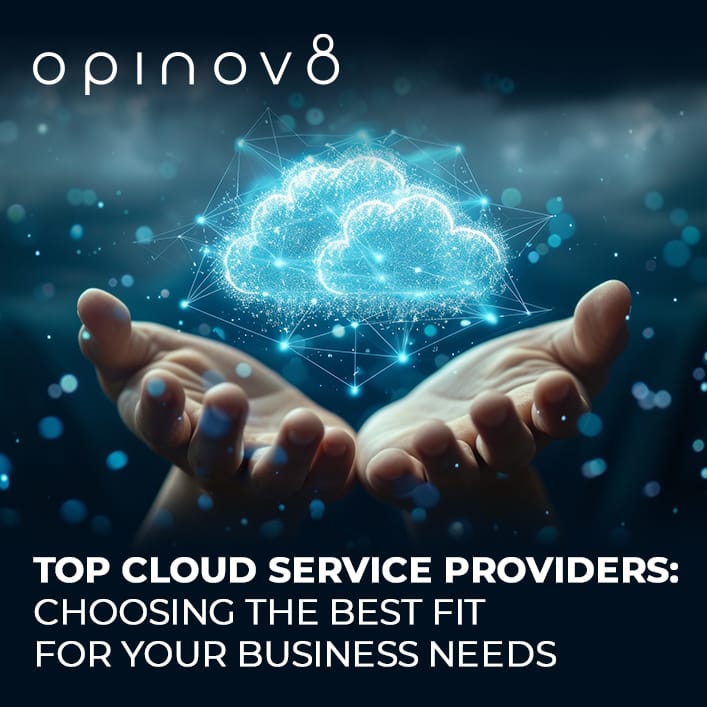
Cloud computing is the backbone that enables companies to scale, innovate, and stay competitive. But here’s the catch: finding the right cloud service provider isn’t as simple as picking the biggest name. Every provider has unique strengths, services, and pricing models, which means the best choice depends on what you actually need. This guide is here to simplify that decision-making process, so you can confidently choose a provider that fits your business.
Let’s start with the basics. A cloud service provider is a company that offers digital services over the internet. Instead of owning physical servers, businesses “rent” access to resources like storage, computing power, databases, and even machine learning tools from these providers. The idea is simple — why build and maintain infrastructure yourself when you can get what you need on demand?
If you’re even slightly familiar with cloud computing, you’ve likely heard of the “Big Three”:
These three providers are popular because they offer vast, secure, and scalable options for companies of all sizes. You can choose an official partner of one of these major providers, or even find a company that works with all three. However, keep in mind that specialized cloud providers might be a better fit, especially if you're looking for solutions tailored to a specific industry or niche needs.
Before diving into specific providers, let’s clarify the types of services they offer. Cloud computing isn’t a one-size-fits-all deal, so here’s a quick breakdown:
Each type has unique advantages, so knowing which model suits your business best will help you narrow down your options.
With so many options out there, it can be overwhelming to make a choice. Here are the most critical factors to help you make an informed decision.
For many businesses, security is the top concern. Not all cloud service providers offer the same level of protection, so it’s essential to dig into their security standards. The best providers comply with regulations like GDPR for data privacy in Europe or HIPAA for healthcare data in the U.S. Look for providers that take a “security-first” approach and have clear protocols for data management.
Reliability can make or break your cloud experience. Check if the provider has a strong track record for uptime — 99.9% uptime (often called “three nines”) is the industry standard, but the top providers aim for 99.999% (or “five nines”). This minimizes downtime and ensures your services are available whenever you need them.
Let’s talk money — cloud pricing can be tricky. Providers often offer pay-as-you-go models, reserved instances for a discount, or even spot pricing for short-term needs. But hidden fees can add up, especially for data transfers or extra storage. Make sure you understand how each provider’s pricing works, so you avoid unexpected costs.
A key benefit of cloud services is scalability, which lets you grow without investing in new hardware. But not all providers handle this equally well. Look for providers with options like automatic scaling that adjust resources as needed, so you’re not scrambling to add capacity during peak times.
Reliable support is crucial, especially if you don’t have a dedicated IT team. Managed cloud service providers often include support as part of their package, but even standard providers offer varying levels of customer service. Review their Service Level Agreements (SLAs) to know what response times and support options you can expect.
Moving to the cloud isn’t always seamless. Top cloud migration service providers offer tools, guidance, and even dedicated teams to make this process easier. Migration can be challenging, especially if you have a large amount of data or complex applications, so look for a provider that offers solid migration support.
If you don’t have the internal resources to manage a cloud environment, a managed cloud service provider might be the best option. They take care of the everyday tasks — maintenance, security patches, monitoring — and ensure your systems are running smoothly. It’s a valuable option for companies that want to free up their teams for core business tasks instead of technical maintenance.
Cloud spending can spiral if not managed carefully. Here are some effective ways to keep costs in check:
Opinov8 specializes in managed cloud services with a human touch. We know the cloud can feel complex, but we’re here to simplify it for you. As a global cloud services provider, we handle everything from cloud migration to ongoing management, so you can focus on growth, not tech issues.
Beyond the essentials, many cloud service providers offer unique services that might fit niche needs or innovative projects. Here’s a look at some options:
Selecting a cloud provider isn’t a one-time decision. It’s a partnership with long-term implications, so consider your needs, growth plans, and technical requirements carefully. Whether it’s saving on costs, boosting reliability, or accessing innovative tools, the right provider can help drive your business forward.
Fill out our feedback form to get tailored guidance and answers to your cloud questions.
Opinov8 announces its new recognition as an Amazon RDS Delivery Partner. This accreditation underscores our expertise in managing and optimizing relational databases using Amazon RDS (Relational Database Service). We work with various engines like Amazon Aurora MySQL, Amazon Aurora PostgreSQL, PostgreSQL, MySQL, MariaDB, and SQL Server. This recognition shows our ability to help clients set […]
Opinov8 announces its new recognition as an Amazon RDS Delivery Partner. This accreditation underscores our expertise in managing and optimizing relational databases using Amazon RDS (Relational Database Service). We work with various engines like Amazon Aurora MySQL, Amazon Aurora PostgreSQL, PostgreSQL, MySQL, MariaDB, and SQL Server. This recognition shows our ability to help clients set […]
IoT will surprise us with its revolutionized potential. Find out more here.
IoT will surprise us with its revolutionized potential. Find out more here.